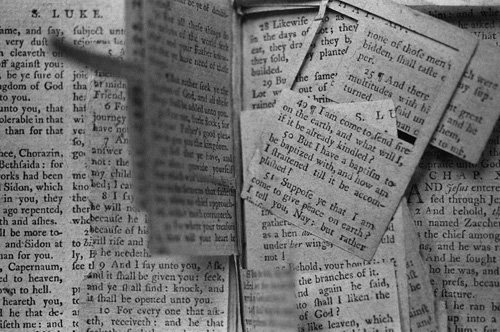Four Lessons I Learned from Jefferson Bethke, the "Why I Hate Religion but Love Jesus" Guy
 Thursday, January 19, 2012 at 12:02AM
Thursday, January 19, 2012 at 12:02AM  My nine year-old daughter listened to Jefferson Bethke’s Why I Hate Religion but Love Jesus just two times, and pronounced him theologically orthodox. I would take her endorsement over many a seminary professor’s.
My nine year-old daughter listened to Jefferson Bethke’s Why I Hate Religion but Love Jesus just two times, and pronounced him theologically orthodox. I would take her endorsement over many a seminary professor’s.
In my work as an editor for ChurchLeaders.com I had a chance to chat with Jeff Bethke for about 30 minutes by phone Saturday night. You can read the heart of the interview here. Students of Jesus is a blog about spiritual formation, so today I’d like to share four spiritual formation lessons I gained from the 22 year-old poet and follower of Jesus:
Spiritual formation begins with new creation: Even a sincere student of Jesus can begin to buy into the lie that it all depends on us. In our interview Jeff emphasized again and again that Jesus brings new birth: “Jesus isn’t just behavior modification; he’s also a heart change that leads to behavior modification. Religion picks the bad fruit off the tree when Jesus just plants a new tree . . . Religion tries as hard as it possibly can to pick off the bad fruit so no one can see it--which is possible with human will--when Jesus says, “how ‘bout we just plant a new tree so that the fruit grows naturally. The root is where the power comes from.”
Little kids can do big things, too: That’s the lesson my daughter took away from the poem, and she’s right: Jeff Bethke met Jesus just four years ago. He acknowledges there’s plenty more to learn, but he can smell the rotting corpse of dead religion (my words, not his). Brand new believers can do big things, too. For example, in John’s gospel, chapter four, a woman who had just one conversation with Jesus sparked a revival in her town. This was the woman with five failed marriages and a live-in arrangement with her current boyfriend: Jesus didn’t give her a new rule (or an old one) he gave her a new heart. Before the episode was finished Jesus told his disciples, the fields are white with harvest.
Spiritual growth follows a different curve than natural growth: In my work as a pastor I saw this over and over. Some people begin coming to church because they wanted to “be better people.” Apart from the new birth, change came slow (or not at all). After the new birth their lives were forever changed. New life in Jesus means we’ve entered a different realm. One sign of the new birth is actual hunger for the things of God. If a new-born baby isn’t hungry, it is either sick or still-born. Jeff Bethke displayed the signs of someone hungry for more of God: in a 30-minute conversation he ranged from Isaiah to Revelation. Jeff quoted scripture with the ease of someone who had begun to internalize the word of God into his life. I’ve seen people attend my church for years who displayed no signs of life. We need to realize that religion and new life can sit side-by-side in the same church. One brings death, the other grows into maturity.
Make room for the poet . . . and the singer, and the musicians, writers, painters, craftsmen and actors. The current pastor of my church has a saying: “The artists should be found in the church or they will be lost in the world.” Jeff Bethke has taken some criticism for using theological words without the precision of a theologian. Yet I loved his answer when I asked him if he would change anything about his poem now that the video went viral: “Part of me says yes simply because I realize the reaction to it made people shut it off without hearing, and I never want to close people's ears by a simple word. But at the same time, I think that was also the word that sparked what it did. [The poem] had a word that resonates; it has a deep influence and a deep history.” Good call: if I’m forced to chose between the theologians and the poets, I’m with the poets.
Internet fame is a fleeting wisp, an inconstant lover. It is fool’s gold. I got the impression that Jeff understands this. He displayed a humble heart and a teachable spirit, even when chatting with a complete stranger of the phone. He’s media-savvy enough to know that once his work was released to the world, other people will make of it what they will. I wish him well as he faces decisions about his future. I’ve learn a few lessons from him, not the least of which were the final words before we said good-bye:
“My biggest hope when I did the interview today is that it encouraged both generations, because it seemed like I was being used as the champion to say ‘screw you’ to the older generation and I really don’t like that. I hope that I can show myself as someone who loves the church, loves the Bible, and loves godly men who speak into our lives--because I don’t want to divide people.”
The Parable of the Storytelling Son
 Saturday, January 14, 2012 at 12:49AM
Saturday, January 14, 2012 at 12:49AM  Andrew Perriman provides our guest post today. He and his wife, Belinda, and have lived in various parts of the world over the last 20 years: the Far East, Africa, Holland, the Middle East, the Nethelands, and London.They recently moved again to Dubai. His current theological interest is in how we retell the biblical story as we negotiate the difficult transition from the center to the margins of our culture following the collapse of Western Christendom.
Andrew Perriman provides our guest post today. He and his wife, Belinda, and have lived in various parts of the world over the last 20 years: the Far East, Africa, Holland, the Middle East, the Nethelands, and London.They recently moved again to Dubai. His current theological interest is in how we retell the biblical story as we negotiate the difficult transition from the center to the margins of our culture following the collapse of Western Christendom.
There was a man who had two sons. The older son loved to tell stories and would keep the relatives and servants that made up his father’s household enthralled for hours with his repertoire of tales—not all of them believable—from the family’s eventful history. The younger son was of a much more rational frame of mind and couldn’t tell a joke to save his life.
One day the younger son came to the father and said, “Father, we don’t need all these stories. What we need is truth. Clear and simple, systematically arranged, with proofs and certain conclusions. I suggest that we organize classes for all the members of your household so that they can be taught the truth. I will devise a syllabus.”
Quite what the father thought of this proposal is unclear, but the younger son was insistent, and so it came about.
When the firstborn son realized what had happened, he became despondent and quickly concluded that he was no longer wanted at home. He thought of asking for his share of the inheritance but decided in the end not to announce his intentions. He left quietly and travelled to a distant country.
Sadly, perhaps because of his gloomy state of mind, he fell into bad company. He told his stories to his new friends, but they laughed at him. “You are a capable story-teller,” they said, “but your stories are so dreary. We are not interested in your unbelievable family sagas. We want to hear about war and women. Mainly women. Bawdy stories about women.”
He did his best to learn some new stories to entertain them with, but his heart was not in it, and when at last he came to himself, he said, “This is ridiculous! I don’t belong here. I will go home and if necessary learn to keep my mouth shut.”
While he was still some distance from the house, his father saw him and ran out to meet him. The son began to speak: “Father, I am sorry. I want to come home. I promise I will not tell….”
But his father interrupted him. “My son! You are back! I am so glad to see you. We are sick and tired of all the lessons with their proofs and dubious conclusions. We want to hear stories again. We want life and death and pain and laughter. We want memories and hope.”
When they arrived back at the house, the younger son was standing in the doorway scowling.
Eight Revelations from the Lost Episodes of the Great Commission
 Wednesday, January 11, 2012 at 11:59PM
Wednesday, January 11, 2012 at 11:59PM  There was once a time when I stood five feet seven inches. The advancing years have exacted a toll on my frame, but once--at my peak--I commanded 67 inches of altitude. Every inch was important to me. I resented anyone who would short me by saying I looked five-six, and I suspect the Great Commission of Matthew’s gospel feels the same way.
There was once a time when I stood five feet seven inches. The advancing years have exacted a toll on my frame, but once--at my peak--I commanded 67 inches of altitude. Every inch was important to me. I resented anyone who would short me by saying I looked five-six, and I suspect the Great Commission of Matthew’s gospel feels the same way.
Matthew’s gospel ends with a stirring call to action from the Lord Jesus. The passage has been popular among Evangelicals for more than a century, but over the years--in our hurry to get to the words of Christ in red--we have chopped a couple of inches from the stature of this great passage. We have ignored the two verses that set the stage; verses 16 and 17. They provide the setting for the Lord’s missional statement. Seriously, who reads these verses? As it turns out, you will, today:
Then the eleven disciples went to Galilee, to the mountain where Jesus had told them to go. When they saw him, they worshiped him; but some doubted. Then Jesus came to them and said, "All authority in heaven and on earth has been given to me. Therefore go and make disciples of all nations, baptizing them in the name of the Father and of the Son and of the Holy Spirit, and teaching them to obey everything I have commanded you. And surely I am with you always, to the very end of the age." Matthew 28: 16-20
In only a few phrases we can discover again that Jesus’ words always come rich with context. Even as the Lord points toward the future, he takes into account our shared past. Here are eight points to consider from the two “lost episodes” of the Great Commission:
The eleven: the short phrase reminds us that there are casualties in the spiritual struggle to become a disciple. Like seed that falls on the hard path, there is some that just does not take root. Yet he continues to speak to those who remain.
Went to Galilee: Jesus based his ministry far from the important centers of religion. It’s true: he bled and died just out of the big city of Jerusalem, but he resurrected Jesus called his friends back to the rural backwaters of Galilee. Why did he do that?
To the mountain: not just a region, Jesus had a specific place in mind, and he still does today. I like to think it’s the mountain from the sermon on the mount, but that’s just the romantic in me. Wherever it was, the disciples knew their destination precisely.
Where Jesus had told them to go: The disciples obeyed. Apart from carrying out those instructions, they would have missed an encounter with the resurrected Lord. It’s a simple revelation, but no less challenging: obedience puts us in a position to hear God. My choices can make it make it easier--or harder--for me to hear his voice.
They worshipped him: make no mistake, this would have been a bit strange. Lifelong Jews, raised to believe in an unseen God bowed down before a man. Our worship habits change at his bidding.
They worshipped him (again): worship precedes mission. Always.
But some doubted: These words first hit me like a thunderbolt--some of those who had seen the resurrected Jesus, those who had “proof” of his glory, still doubted! Imagine the scene around Jesus: his best friends giving him worship in a private setting, yet in some of their minds and hearts there was still doubt. Here’s the good news: their doubt did not disqualify them. He still received them, and he gave the “Great Commission” even to those who doubted.
But some doubted (again): compare this phrase with his instructions to leave Jerusalem and return to Galilee. If they did not obey him, they never would have heard the Great Commission. From these two points together we discover that disobedience may keep me from hearing his voice, but doubt will not.
It turns out the Bible school teachers were right all along: we should always look for the full context of a passage. To lose just two small verses would mean the loss of the encouragement we need to complete the mission.
Meditation: The Familiar Neighborhoods of God
 Monday, January 9, 2012 at 12:01AM
Monday, January 9, 2012 at 12:01AM  Chicago is my home town. When I hear someone say, “I’m from Chicago,” I immediately ask, “What part?” North side? South side? Downtown? Polish neighborhood, Irish neighborhood, Lithuanian, the projects, the suburbs, the Cubs, the Sox--what? It’s a big place: too big to be contained by any one description. Most people from Chicago have only hung out in a few neighborhoods.
Chicago is my home town. When I hear someone say, “I’m from Chicago,” I immediately ask, “What part?” North side? South side? Downtown? Polish neighborhood, Irish neighborhood, Lithuanian, the projects, the suburbs, the Cubs, the Sox--what? It’s a big place: too big to be contained by any one description. Most people from Chicago have only hung out in a few neighborhoods.
The Creator of the universe is bigger than Chicago. A lot bigger. When we say, “I know God,” we make a laughable statement. We know him: but we don’t know all of him. He’s too big to be contained by any one description. If we know God at all, we are familiar with only a few neighborhoods of him.
Out of everything you know about God, where do you most often find yourself? In what neighborhood do you hang out? The answer says nothing about him but reveals so much about you.
I’ve discovered that we lean toward one side of him or another. A question like, “Which is greater: his power or his goodness?” asks nothing about God and everything of ourselves. Some people lean into his goodness. Others into his power. If we lean toward his power we see him in ruling in the affairs of men: we look for order and sense in our everyday lives. If we lean toward his goodness we see him as ever-present and empathetic, soothing and comforting those in need. Yet neither picture is complete. Indeed: both pictures together are not enough.
This week’s meditation asks us to leave the theological question alone for a while and consider: when I hang out with God, what neighborhood is most familiar to me? God as Father? God as ruler? Is he lover, friend, dictator, lawgiver, sin-forgiver, designer? Out of a thousand definitions my mind can only handle one or two. My heart, however, yearns for more: more of him.
I begin to discover the prayers of Saint Augustine: “Narrow is the mansion of my soul; enlarge it so that You may enter in.” Or C.S. Lewis, “Not as I imagine You are, but as You know Yourself to be.” These are some of the prayers of the wise, and the exercises of a lifetime. These are prayers we should pray.
When we become comfortable with only one or two neighborhoods of God we find safety and comfort, but it is an illusion: we begin to exchange the truth of who he is for a god we can contain or understand. Come, let’s explore other neighborhoods of him.
The Parable of Shrewd (Good Guy) Manager
 Saturday, January 7, 2012 at 07:36AM
Saturday, January 7, 2012 at 07:36AM How do you argue with a story? One of the joys reading of the parables of Jesus is discovering the multiple meanings layered in by the Storyteller. Just when you think you understand his meaning, along comes another possibility.This eight-minute video suggests that the Parable of the Shrewd Manager is actually a tale of righteousness breaking into (previously) shady business dealings. I think you'll be surprised:
Does this video open up new understandings? How have you interpreted this parable in the past? Join the conversation and let us know.

